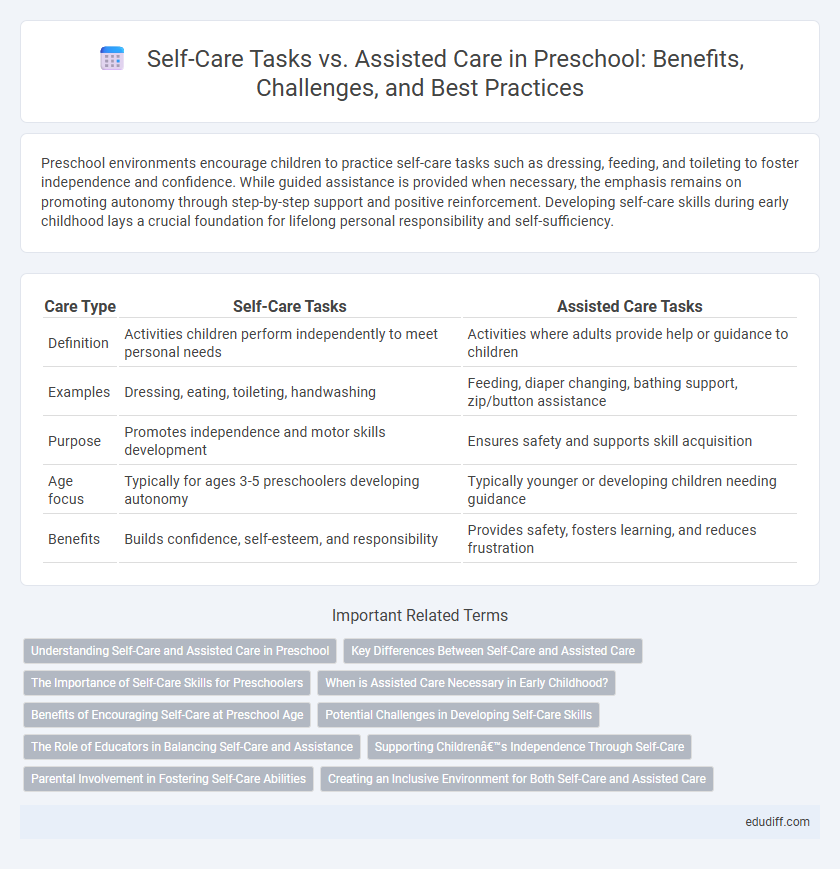Preschool environments encourage children to practice self-care tasks such as dressing, feeding, and toileting to foster independence and confidence. While guided assistance is provided when necessary, the emphasis remains on promoting autonomy through step-by-step support and positive reinforcement. Developing self-care skills during early childhood lays a crucial foundation for lifelong personal responsibility and self-sufficiency.
Table of Comparison
| Care Type | Self-Care Tasks | Assisted Care Tasks |
|---|---|---|
| Definition | Activities children perform independently to meet personal needs | Activities where adults provide help or guidance to children |
| Examples | Dressing, eating, toileting, handwashing | Feeding, diaper changing, bathing support, zip/button assistance |
| Purpose | Promotes independence and motor skills development | Ensures safety and supports skill acquisition |
| Age focus | Typically for ages 3-5 preschoolers developing autonomy | Typically younger or developing children needing guidance |
| Benefits | Builds confidence, self-esteem, and responsibility | Provides safety, fosters learning, and reduces frustration |
Understanding Self-Care and Assisted Care in Preschool
Self-care tasks in preschool involve children independently managing activities like dressing, toileting, and feeding, which foster autonomy and fine motor skills development. Assisted care includes adult support during these activities when children require guidance, ensuring safety and promoting learning through modeling. Understanding the balance between self-care and assisted care is crucial for educators to tailor support that encourages independence while providing necessary help.
Key Differences Between Self-Care and Assisted Care
Self-care tasks in preschool focus on developing children's independence in activities like dressing, eating, and hygiene, fostering motor skills and confidence. Assisted care involves adult support to complete these activities, ensuring safety and guidance when children face challenges. Key differences include the level of child autonomy and adult intervention, with self-care promoting skill mastery and assisted care providing necessary help.
The Importance of Self-Care Skills for Preschoolers
Developing self-care skills in preschoolers enhances their independence and boosts confidence, enabling them to perform daily tasks such as dressing, feeding, and hygiene without constant adult assistance. Early mastery of these tasks lays a foundation for cognitive and motor skill development, promoting overall growth and social competence. Encouraging self-care reduces reliance on assisted care, fostering a sense of responsibility and preparing children for future academic and social environments.
When is Assisted Care Necessary in Early Childhood?
Assisted care becomes necessary in early childhood when children face developmental delays, physical disabilities, or health conditions that limit their ability to independently perform self-care tasks such as dressing, feeding, or toileting. Early intervention through assisted care supports skill acquisition, promotes safety, and enhances children's confidence and independence in daily routines. Educators and caregivers assess individual needs to determine the appropriate balance between fostering autonomy and providing necessary support for optimal developmental outcomes.
Benefits of Encouraging Self-Care at Preschool Age
Encouraging self-care tasks in preschool fosters independence, fine motor skill development, and boosts confidence in young children. Performing activities like dressing, handwashing, and snack preparation supports cognitive growth and nurtures responsibility. This early autonomy reduces reliance on assisted care, preparing children for smoother transitions into formal schooling and social environments.
Potential Challenges in Developing Self-Care Skills
Preschool children often face potential challenges in developing self-care skills such as dressing, toileting, and feeding due to limited fine motor abilities and cognitive understanding. These difficulties can lead to increased dependence on assisted care from teachers or caregivers, slowing the acquisition of independence. Addressing these challenges requires tailored strategies that promote gradual skill development and confidence in self-care routines.
The Role of Educators in Balancing Self-Care and Assistance
Educators in preschools play a crucial role in promoting self-care tasks such as dressing, toileting, and handwashing, fostering independence and fine motor skills among young children. They carefully assess each child's developmental stage to determine when to provide assistance, ensuring safety while encouraging autonomy. By balancing support and encouragement, educators create a nurturing environment that builds confidence and prepares children for future learning experiences.
Supporting Children’s Independence Through Self-Care
Supporting children's independence through self-care tasks encourages the development of fine motor skills and confidence while fostering a sense of responsibility in preschoolers. Self-care activities such as dressing, toileting, and handwashing enable children to practice autonomy and reduce reliance on assisted care. Structured guidance combined with age-appropriate expectations promotes mastery of these tasks, laying the foundation for lifelong independent habits.
Parental Involvement in Fostering Self-Care Abilities
Parental involvement plays a crucial role in fostering self-care abilities in preschool children by creating structured routines and encouraging independence in daily tasks such as dressing, feeding, and hygiene. Research shows that consistent parental support enhances children's confidence and motor skills, leading to improved self-care proficiency. Engaging parents through workshops and home-based activities strengthens the transition from assisted care to autonomous self-care in early childhood development.
Creating an Inclusive Environment for Both Self-Care and Assisted Care
Creating an inclusive preschool environment supports both self-care tasks and assisted care by providing adaptive tools and flexible routines tailored to diverse developmental needs. Incorporating sensory-friendly spaces and accessible materials empowers children to practice independence while ensuring staff can seamlessly offer assistance when necessary. Prioritizing individualized support fosters confidence and social participation, promoting equitable learning experiences for all children.
Self-care tasks vs Assisted care Infographic

 edudiff.com
edudiff.com